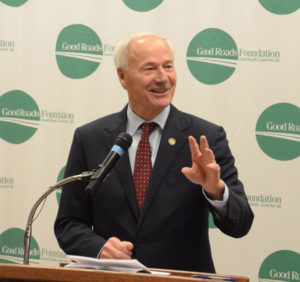
By Steve Brawner, © 2018 by Steve Brawner Communications, Inc.
In two years, you’ll probably be asked to vote for higher taxes for Arkansas’ highways, for three reasons.
One reason is that highways are clearly underfunded. The Arkansas Department of Transportation has identified $9.3 billion in needs but only $4.5 billion in expected revenues over the next 10 years – numbers confirmed by a legislative audit. That extra $4.8 billion would maintain and improve the nation’s 12th largest highway system, but it would not fund the long-desired I-49 in western Arkansas and I-69 in south Arkansas.
Why the big shortfall? Highways are funded primarily through fuel taxes, which haven’t changed at the federal level since 1993 and in Arkansas since 1999. Neither were indexed to inflation, so as construction costs have risen, revenues have not. Meanwhile, vehicles have become more fuel efficient. Some – maybe someday many – don’t use fuel at all.
This has been the reality for a long time. Scott Bennett, ARDOT’s director, told me he’s made basically the same speech for 15 years.
What’s changed are the second and third reasons you’ll be asked to vote for higher taxes for highways.
The second reason is it’s now obvious the money isn’t coming from Washington. President Trump talked about a big infrastructure plan, but if it didn’t happen when his party controlled everything, it won’t happen now that Congress is split. That’s why Gov. Asa Hutchinson told the Good Roads Foundation Tuesday that it’s time to “forge our own future.”
That brings us to the third reason you’ll be asked for your vote. Hutchinson says he’ll make highways a priority these next two years after focusing on other needs the previous four.
This will be a tough sell because we’re talking about huge amounts of money. Raising $400 million annually would require a 28.4 cent per gallon fuel tax increase, or an increase in vehicle registration fees of $208, or a general sales tax increase of 1.16 percent.
It’s hard to imagine voters approving increases that big, so any proposal might have to include other alternatives.
One possibility is making permanent the half-cent sales tax voters approved in 2012 to fund the highway-widening Connecting Arkansas Program. That tax ends in 2023. Extending it, or just paying what we’re already paying, would fund close to half the annual shortfall. Hutchinson told reporters Tuesday that extending the tax would be “one of the key foundational ingredients” in a potential highway plan.
Another possibility is a bond issue. Borrowing the money would be less painful at first. It’s how Arkansas funded the Connecting Arkansas Program and the earlier Interstate Rehabilitation Program, both approved by voters. The downside? Almost 25 percent of those programs’ revenues – almost $340 million combined – have gone to interest costs rather than roads.
Other options? Highway advocates have long wanted to dedicate to highways the sales taxes paid for cars, parts, etc. That money currently goes into the general fund. Hutchinson doesn’t like that idea because transferring $400 million to highways would divert 7 percent of the current budget. Another option is increasing the diesel tax. Most drivers wouldn’t have to pay higher taxes at the pump, but trucking companies would pass many of the costs down to consumers. Toll roads? Arkansas doesn’t really have the traffic volume, and they’re not as efficient as other mechanisms.
There’s one other issue. Traditionally, cities and counties each have received 15 percent of highway revenues, so raising $400 million for state highways requires raising $592 million overall. We could decide not to do that this time, but then the governor would lose the support of mayors and county judges.
Legislators could increase funding for highways on their own during the 2019 legislative session, but that’s very unlikely. They don’t want to vote to raise taxes of any kind. However, they probably will give voters the chance to raise taxes on themselves, particularly if the governor wants it badly enough.
The big question is, will voters say yes? We tend to want government services without paying for them. We want to go where we want – in a car, not a bus, train or bicycle – and never get stuck in traffic. And we don’t think about the fact that we’re driving on highways mostly built decades ago and funded by declining revenue sources.
Choices will have to be made by lawmakers, voters and drivers.
So would you pay higher taxes for highways? If so, how much?